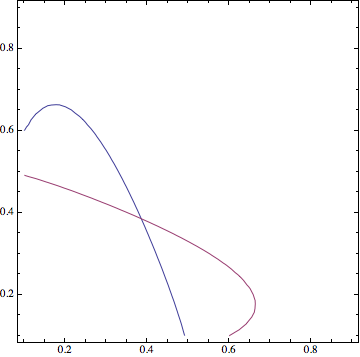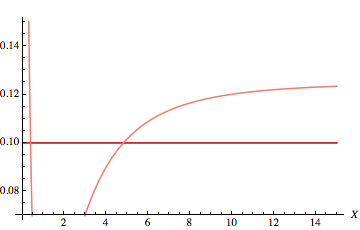I have the following equations and I would like to solve them in Mathematica anyway. Numerical results are very much welcomed. However, when I use the command NSolve, I get the following error message:
The expression $b^{\frac{1}{2}\log (ab)}$ involves unknowns in more than one argument, so inverse functions cannot be used.
Here are the equations that I want to solve:
NSolve[
{(Integrate[(E^(-x^2/2 + Log[a]^2/Log[a*b])*(E^(-(-1 + x)^2/2 + x^2/2))^(Log[a]/Log[a*b])*Log[E^(Log[a]^2/Log[a*b])*(E^(-(-1 + x)^2/2 + x^2/2))^(Log[a]/Log[a*b])])/
Sqrt[2*Pi], {x, 1/2 + Log[a^(-1)], 1/2 + Log[b]}] +
(a*Erfc[(1/2 + Log[b])/Sqrt[2]]*Log[a])/2)/((1 + Erf[(1/2 + Log[a^(-1)])/Sqrt[2]])/2 +
(E^((Log[a]^2*(1 + 2*Log[a*b]))/(2*Log[a*b]^2))*(-Erf[(-2*Log[a] + (1 + 2*Log[a^(-1)])*Log[a*b])/(2*Sqrt[2]*Log[a*b])] +
Erf[(-2*Log[a] + (1 + 2*Log[b])*Log[a*b])/(2*Sqrt[2]*Log[a*b])]))/(2*a^(1/(2*Log[a*b]))) + (a*Erfc[(1/2 + Log[b])/Sqrt[2]])/2) -
Log[(1 + Erf[(1/2 + Log[a^(-1)])/Sqrt[2]])/2 + (E^((Log[a]^2*(1 + 2*Log[a*b]))/(2*Log[a*b]^2))*
(-Erf[(-2*Log[a] + (1 + 2*Log[a^(-1)])*Log[a*b])/(2*Sqrt[2]*Log[a*b])] + Erf[(-2*Log[a] + (1 + 2*Log[b])*Log[a*b])/(2*Sqrt[2]*Log[a*b])]))/
(2*a^(1/(2*Log[a*b]))) + (a*Erfc[(1/2 + Log[b])/Sqrt[2]])/2] == 0.1,
(Integrate[(E^(-(-1 + x)^2/2 + Log[b]^2/Log[a*b])*Log[E^(Log[b]^2/Log[a*b])/
(E^(-(-1 + x)^2/2 + x^2/2))^(Log[b]/Log[a*b])])/
((E^(-(-1 + x)^2/2 + x^2/2))^(Log[b]/Log[a*b])*Sqrt[2*Pi]), {x, 1/2 + Log[a^(-1)], 1/2 + Log[b]}] +
(b*(1 + Erf[(-1/2 + Log[a^(-1)])/Sqrt[2]])*Log[b])/2)/
((b*(1 + Erf[(-1/2 + Log[a^(-1)])/Sqrt[2]]))/2 + (E^((Log[b]^2*(1 + 2*Log[a*b]))/
(2*Log[a*b]^2))*(Erf[(-1 + 2*Log[b]*(1 + Log[a*b]^(-1)))/(2*Sqrt[2])] -
Erf[(-1 + 2*Log[a^(-1)] + (2*Log[b])/Log[a*b])/(2*Sqrt[2])]))/
(2*b^(1/(2*Log[a*b]))) + Erfc[(-1/2 + Log[b])/Sqrt[2]]/2) -
Log[(b*(1 + Erf[(-1/2 + Log[a^(-1)])/Sqrt[2]]))/2 +
(E^((Log[b]^2*(1 + 2*Log[a*b]))/(2*Log[a*b]^2))*(Erf[(-1 + 2*Log[b]*(1 + Log[a*b]^(-1)))/(2*Sqrt[2])] -
Erf[(-1 + 2*Log[a^(-1)] + (2*Log[b])/Log[a*b])/(2*Sqrt[2])]))/(2*b^(1/(2*Log[a*b]))) + Erfc[(-1/2 + Log[b])/Sqrt[2]]/2] == 0.1},
{a, b}]
f0[x_] := 1/Sqrt[2*Pi*1^2]*E^(-(x + 0)^2/(2*1^2))
f1[x_] := 1/Sqrt[2*Pi*1^2]*E^(-(x - 1)^2/(2*1^2))
yl = -1.070751889428462
yu = 2.0707518894284505
a = 1/l[yl]
b = l[yu]
l[x] = f1[x]/f0[x]
Solve[-(1/2) (-1 + x)^2 + x^2/2 - Log[y] == 0, x]
--> here I must find the inverse function of $l$ but I couldn't do that either, so then I did it half-manually, which is:
ll[x_] := 1/2 + Log[x]
NSolve[{(Integrate[a*InputForm[1/(E^(x^2/2)*Sqrt[2*Pi])]*Log[a], {x, ll[b], Infinity}] + Integrate[E^(Log[a]^2/Log[a*b])*InputForm[1/(E^(x^2/2)*Sqrt[2*Pi])]*
l[x]^(Log[a]/Log[a*b])*Log[E^(Log[a]^2/Log[a*b])*l[x]^(Log[a]/Log[a*b])], {x, ll[a^(-1)], ll[b]}])/
(Integrate[InputForm[1/(E^(x^2/2)*Sqrt[2*Pi])], {x, -Infinity, ll[a^(-1)]}] + Integrate[a*InputForm[1/(E^(x^2/2)*Sqrt[2*Pi])], {x, ll[b], Infinity}] +
Integrate[E^(Log[a]^2/Log[a*b])*InputForm[1/(E^(x^2/2)*Sqrt[2*Pi])]*l[x]^(Log[a]/Log[a*b]), {x, ll[a^(-1)], ll[b]}]) -
Log[Integrate[InputForm[1/(E^(x^2/2)*Sqrt[2*Pi])], {x, -Infinity, ll[a^(-1)]}] + Integrate[a*InputForm[1/(E^(x^2/2)*Sqrt[2*Pi])], {x, ll[b], Infinity}] +
Integrate[E^(Log[a]^2/Log[a*b])*InputForm[1/(E^(x^2/2)*Sqrt[2*Pi])]*l[x]^(Log[a]/Log[a*b]), {x, ll[a^(-1)], ll[b]}]] == 0.1,
(Integrate[b*InputForm[1/(E^((-1 + x)^2/2)*Sqrt[2*Pi])]*Log[b], {x, -Infinity, ll[a^(-1)]}] +
Integrate[(E^(Log[b]^2/Log[a*b])*InputForm[1/(E^((-1 + x)^2/2)*Sqrt[2*Pi])]*Log[E^(Log[b]^2/Log[a*b])/l[x]^(Log[b]/Log[a*b])])/l[x]^(Log[b]/Log[a*b]),
{x, ll[a^(-1)], ll[b]}])/(Integrate[InputForm[1/(E^((-1 + x)^2/2)*Sqrt[2*Pi])], {x, ll[b], Infinity}] +
Integrate[b*InputForm[1/(E^((-1 + x)^2/2)*Sqrt[2*Pi])], {x, -Infinity, ll[a^(-1)]}] +
Integrate[(E^(Log[b]^2/Log[a*b])*InputForm[1/(E^((-1 + x)^2/2)*Sqrt[2*Pi])])/l[x]^(Log[b]/Log[a*b]), {x, ll[a^(-1)], ll[b]}]) -
Log[Integrate[InputForm[1/(E^((-1 + x)^2/2)*Sqrt[2*Pi])], {x, ll[b], Infinity}] + Integrate[b*InputForm[1/(E^((-1 + x)^2/2)*Sqrt[2*Pi])],
{x, -Infinity, ll[a^(-1)]}] + Integrate[(E^(Log[b]^2/Log[a*b])*InputForm[1/(E^((-1 + x)^2/2)*Sqrt[2*Pi])])/l[x]^(Log[b]/Log[a*b]), {x, ll[a^(-1)], ll[b]}]] ==
0.1}, {a, b}]
Please let me know if there is still something missing.
MORE NOTES:
1- $y_u>y_l$ should be satisfied
2- $a,b>0$ and $ab>1$
3- $l[x]$ monotone increasing. This means one can choose some densities $f0[x_]$ and $f1[x_]$ such that $l$ is monotone increasing. Because we need its inverse!
According to these notes, is the solution unique? or are there still more roots if I change $f0[x_]$ and $f1[x_]$?
Is there anyway to get a solution? I also tried FindRoot and SolveAlways which gave no result at all. Thank you very much in advance.



FindRootsay? Was there any error message? This looks like a rather unfriendly equation. $\endgroup$